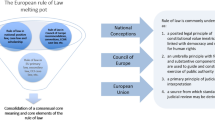Abstract
Over the last 20 years the European Union (EU) has been associated with the export of certain universal norms, rules and practices to other countries. In academic circles, the concept is called “normative power Europe”. Democracy, rule of law, strong commitment to human rights and fundamental freedoms, and social justice: these principles form the core identity of the EU. Based on shared political, economic and cultural ties among member states, the EU has sought to promote these norms also in the neighbouring countries, including Russia. However, the outbreak of the violent conflict between Russia and Ukraine at the end of 2013 clearly demonstrates that the EU has failed in its pursuit in Russia despite extensive mutual relations and comprehensive financial support provided by the EU. The aim of the article is to analyse how consistent has the EU been in defending and promoting European values and norms in the international arena and to Russia during the Ukrainian conflict.
Similar content being viewed by others
References
Consolidated versions of the Treaty on European Union and the Treaty on the Functioning of the European Union—Consolidated version of the Treaty on European Union (2012).
Diez, T. 2013. Constructing the Self and Changing Others: Reconsidering Normative Power Europe. Millennium 33(3): 613–636.
Diez, T., and I. Manners. 2007. Reflecting on Normative Power Europe. In Power in World Politics, ed. F. Berenskoetter, and M.J. Williams. New York: Routledge.
Diez, T., and I. Manners. 2014. Reflecting on Normative Power Europe. In A Different Kind of Power? The EU´s Role in International Politics, ed. T. Diez. New York: Idebate Press.
Friis, L., and A. Murphy. 1999. The European Union and Central and Eastern Europe: Governance and Boundaries. Journal of Common Market Studies 37(2): 211–232.
Gerrits, A. 2009. Normative Power Europe in a Changing World: A Discussion. In Introductory Observations on a Controversial Notion. Netherlands Institute of International Relations. https://www.clingendael.nl/sites/default/files/20091200_cesp_paper_gerrits.pdf. Accessed 25 Oct 2017.
Hardwick, D. 2011. Is the EU a Normative Power? http://www.e-ir.info/2011/09/03/is-the-eu-a-normative-power/. Accessed 27 Oct 2017.
Hyde-Price, A. 2008. A ‘tragic actor’? A realist perspective of ‘ethical power Europe. International Affairs 84(1): 29–44.
Lavenex, S. 2004. EU external governance in ‘wider Europe’. Journal of European Public Policy 11(4): 680–700.
Mälksoo, L. 2015. Russian Approaches to International Law. Oxford: Oxford University Press.
Manners, I. 2001. Normative Power Europe: The International Role of the EU. In European Community Studies Association, Biennial Conference. http://aei.pitt.edu/7263/1/002188_1.PDF. Accessed 24 Oct 2017.
Manners, I. 2002. Normative Power Europe: A Contradiction in Terms? Journal of Common Market Studies 40(2): 235–258.
Manners, I. 2009. The Concept of Normative power in World Politics. DIIS BRIEF, May 2009.
Nicolaidis, K., and R. Howse. 2002. This is my EUtopia …’: Narrative as Power. Journal of Common Market Studies 40(4): 767–792.
Skolimowska, A. 2015. The European Union as a “Normative Power” in International Relations. Theoretical and Empirical Challenges. Yearbook of Polish European Studies 18: 111–131.
Veebel, V., L. Kulu, and A. Tartes. 2014. Conceptual factors behind the poor performance of the European Neighbourhood policy. Lithuanian Foreign Policy Review 31(2014): 85–102.
Whitman, R. 1998. From Civilian Power to Superpower? The International Identity of the European Union. Basingstoke: Macmillan.
Author information
Authors and Affiliations
Corresponding author
Rights and permissions
About this article
Cite this article
Veebel, V. European Union as normative power in the Ukrainian–Russian conflict. Int Polit 56, 697–712 (2019). https://doi.org/10.1057/s41311-018-0156-y
Published:
Issue Date:
DOI: https://doi.org/10.1057/s41311-018-0156-y



